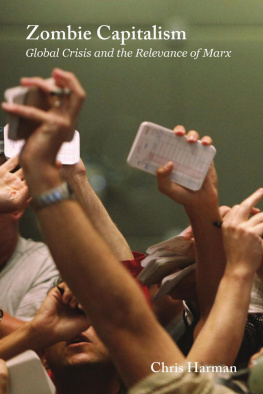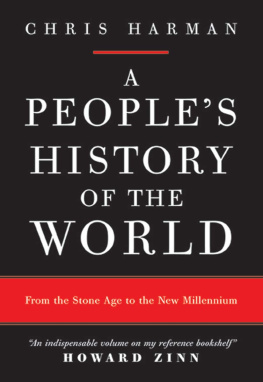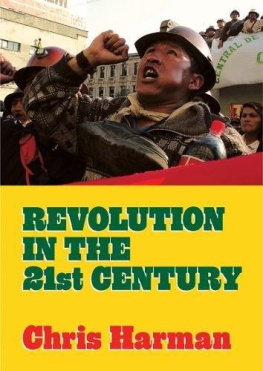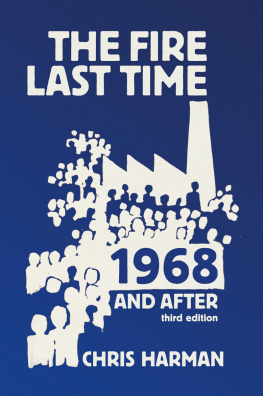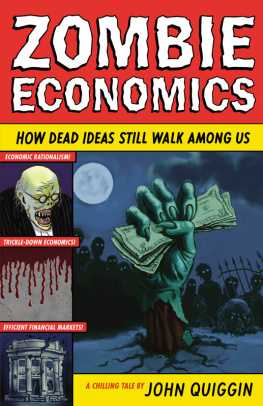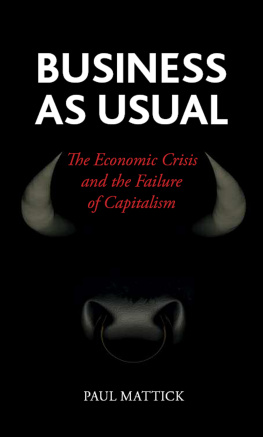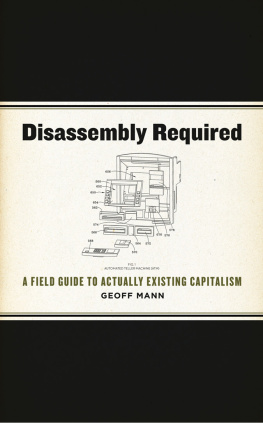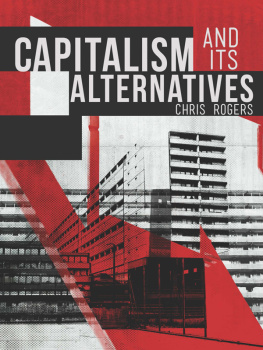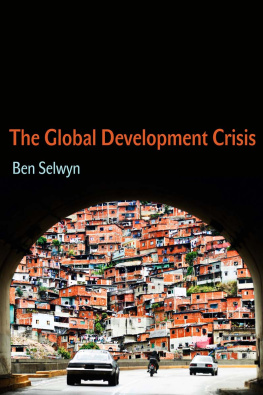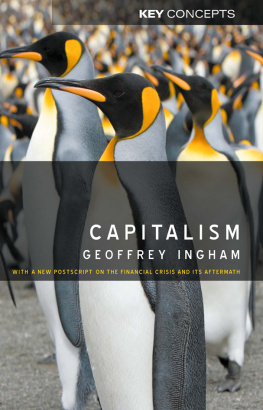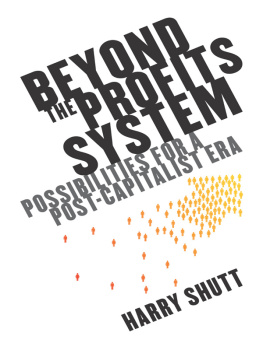Introduction
An unstable world
and the unhappiness is going to increase.
Even the most craven apologists for capitalism find it hard to deny this reality any longer, as the worst economic crisis since the Second World War continues to deepen as I write.
The worlds best known banks have only been saved from going bust by vast government bail-outs. Thousands of factories, stores and offices are closing across Europe and North America. Unemployment is shooting upwards. Twenty million Chinese workers have been told they have to return to the villages because there are no jobs for them in the cities. An Indian employers think tank warns that ten million of their employees face the sack. A hundred million of the worlds people in the Global South are still threatened with hunger because of last years doubling of grain prices, while in the richest country in the world, the United States, three million families have been dispossessed from their homes in 18 months.
Yet just two years ago, when I began this book, the message was very different: Recent high levels of growth will continue, global inflation will stay quite subdued, and global current account imbalances will gradually moderate, was the consensus among mainstream economists, reported the Bank of International Settlements. The politicians, industrialists, financiers and commentators all agreed. They toasted the wonders of free markets and rejoiced that entrepreneurial genius had been liberated from regulation. It was wonderful, they told us, that the rich were getting richer because that provided the incentives which made the system so bountiful.
Trade was going to obliterate hunger in Africa. Economic growth was draining the vast pools of poverty in Asia. The crises of the 1970s, 80s, 90s and 2001-2 were memories we could put behind us. There might be horrors in the world, wars in the Middle East, civil wars in Africa, but these were to be blamed on the shortsightedness of essentially honest politicians in Washington and London who may have made mistakes but whose humanitarian intervention was still needed to deal with psychopathic maniacs. The words of those who saw things differently were ignored, as the media poured out candyfloss layers of celebrity culture, upper middle class self-congratulation and senseless nationalist euphoria over sporting events.
Governments have been throwing hundreds of billions to those who run the banksand tens of billions to those who run the multinational car firmsin the hope that this will somehow stop the crisis. But they cannot agree among themselves how to do this and even whether it will work or not.
Yet one thing is certain. The moment any part of the global economy begins to stabilise they will forget the hundreds of millions of lives that have been shattered by the crisis. A few months when banks are not collapsing and profits are not falling through the floor and the apologists will be pumping out candyfloss once again. Their futures will seem better and they will generalise this to the world at large with renewed talk about the wonders of capitalism and the impossibility of any alternativeuntil crisis hits again and throws them into another panic.
But crises are not some new feature of the system. They have occurred at longer or shorter intervals ever since the industrial revolution established the modern form of capitalism in Britain fully at the beginning of the 19th century.
The poverty of economics
The mainstream economics that is taught in schools and universities has proved completely unable to come to terms with such things. The Bank of International Settlements recognises that:
These are not accidental failings. They are built into the very assumptions of the neoclassical or marginalist school that has dominated mainstream economics for a century and a quarter. Its founders set themselves the task of showing how markets clearthat is, how all the goods in them will find buyers. But that assumes in advance that crises are not possible.
The implausibility of the neoclassical model in the face of some of the most obvious features of capitalism has led to recurrent attempts within the mainstream to bolt extra elements onto it in an ad hoc way. None of these additions, however, alter the basic belief that the system will return to equilibriumproviding prices, and especially wages, adjust to market pressures without hindrance. Even John Maynard Keynes, who went further than anyone else in the mainstream in questioning the equilibrium model, still assumed it could be made to work with a degree of government intervention.
There were always challenges to such complacency. The Austrian economist Joseph Schumpeter derided any idea of equilibrium as incompatible with what he saw as the great positive virtue of capitalism, its dynamism. Some of Keyness disciples went much further than he did in breaking with neoclassical orthodoxy. Cambridge economists tore apart the theoretical basis of the neoclassical school. Yet the orthodoxy is as strongly entrenched in the universities and schools as ever, pumping into the heads of each new generation a picture of the economic system that bears little relationship to reality. The pressure on students to study the books putting forward such views as if they were scientific texts has led to Paul Samuelsons Economics and Lipseys An Introduction to Positive Economics selling millions of copies.
Yet what is involved is not just abstract academic scholasticism. The orthodoxy is an ideological product in the sense that it operates from the standpoint of those who profit from the market system. It presents their profiteering as the supreme way of contributing to the common good, while absolving them of anything that goes wrong. And it rules out any fundamental critique of the present system, in a way that suits those with commanding positions in educational structures, connected as they are to all the other structures of capitalism. The radical Keynesian Joan Robinson summed up the situation:
The radicals have the easier case to make. They have only to point to the discrepancies between the operation of the modern economy and the ideas by which it is supposed to be judged, while the conservatives have the well nigh impossible task of demonstrating that this is the best of all possible worlds. For the same reason, however, the conservatives are compensated by occupying positions of power, which they can use to keep criticism in check... The conservatives do not feel obliged to answer radical criticisms on their merits and the argument is never fairly joined.
But even most of the radicals usually start by taking the existing system for granted. The arguments of the radical Keynesians like Joan Robinson have always been in terms of amendments to the system, through greater state intervention than that envisaged by the mainstream. They have not seen the system itself as driven by an inner dynamic whose destructive effects are not restricted to purely economic phenomena. In the 21st century it is producing wars, hunger and climate change as well as economic crises, and doing so in ways which threatens the very basis of human life.
What they do not recognise is that 21st century capitalism as a whole is a zombie system, seemingly dead when it comes to achieving human goals and responding to human feelings, but capable of sudden spurts of activity that cause chaos all around.
A world turned against ourselves
There has only been one serious tradition of analysis to attempt to provide an account of the system in these terms. It is that which originated in the writings of Karl Marx and his long-time colleague Frederick Engels.
Marx came to adulthood in the early 1840s, just as industrial capitalism began to make its first, limited, impact on southern Germany where he was born. Engels was sent by his father to help manage a factory in Manchester, where the new system was already flourishing. They shared with almost the whole of their generation of German intellectual youth a desire to overthrow the oppressive Prussian feudal system of class rule presided over by a monarch with despotic powers. But they soon began to grasp that the industrial capitalism that was supplementing feudalism contained oppressive features of its own. Above all it was characterised by an inhuman subordination of the mass of people to the work they did. What Marx was beginning to discover about the functioning of this then-new system led him to undertake a critical reading of its most eminent proponents, political economists like Adam Smith and David Ricardo. His conclusion was that, although the system vastly increased the amount of wealth humans could produce, it also denied the majority of them the benefits of this wealth:

